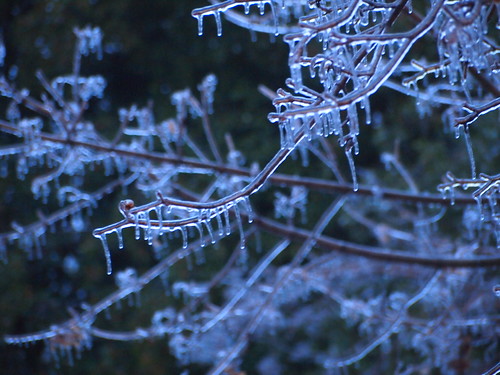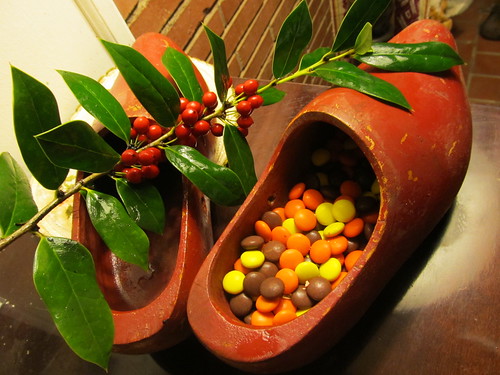In 1988, Washington, D.C.'s venerable beer pub, the Brickskeller, held its first ever Christmas Beer Tasting. Back then, there were only four 'local' breweries in Virginia and Maryland (and none in D.C.): G. Heileman Brewing Company, in Halethorpe, Maryland, Anheuser-Busch, in Williamsburg, Virginia, and upstart 'micro-breweries' Chesbay, in Virginia Beach, Virginia, and British Brewing Company, in Glen Burnie, Maryland. Schoolteacher and beer raconteur Bob Tupper, the host, would have to round out the evening's tasting with beers from breweries elsewhere.
The final winter beer tasting at the Brickskeller was held in December of 2010. Proprietors Dave and Diane Alexander would sell the restaurant/pub/hotel later that month. But the tradition of the Winter Holidaze Extravaganzee has continued at their other restaurant: D.A.'s R.F.D. (The "DA" stands for Dave (and Diane) Alexander; the "RFD" for "regional food and drink").
It was held this year on 19 December 2012, for the 25th time, and, this time, with 16 local breweries represented. Many, many more local breweries could have been invited: there are five breweries in Washington, D.C. proper, forty from Virginia, and twenty in Maryland. Four in 1988; sixty-five in 2012. What a difference a quarter century has made.
I did find the list of the missing to be somewhat peculiar. There was no Capitol City Brewing, Washington D.C.'s first brewpub since Prohibition (although now brewing in northern Virginia). There was a reason for this, however, which I learned of a few days later. Although D.C.'s 3 Stars Brewing was present, where was DC Brau, the first production brewery in the the District of Columbia since 1956? And, where was Flying Dog, Maryland's largest brewery, and the 23rd largest regional brewery in the U.S.?
As it stood, however, even sixteen were too many for the evening, which began around 7 pm and continued past 11:30 pm. Inviting four more breweries but splitting the event over two nights would have been logistically better. Here's the evening's roster:
- 3 Stars (Washington, DC): Winter Madness Barleywine
- Brewers Alley (Frederick, MD): Riot Rye Pale Ale
- Devils Backbone (Roseland, VA): 16 Point IPA
- District Chophouse (Washington, DC): Solidarity Saison
- Dog Brewing (Westminster, MD): Oatmeal Stout
- DuClaw Brewing (Bowie, MD): Pumpkin Retribution
- Gordon Biersch (Rockville, MD): Winter Bock
- Heavy Seas (Baltimore, MD): Winter Storm Imperial ESB
- Lost Rhino (Ashburn, VA): Triple IPA
- Mad Fox Brewing (Falls Church, VA): Crazy Ivan Russian Imperial Stout
- Port City (Alexandria, VA): Tidings Spiced Imperial Wit
- Red Brick Station (White Marsh, MD): Winter Solstice
- Rock Bottom (Ballston, Arlington, VA): Fallen Angel Boubon-aged Tripel
- Sweetwater Tavern (Centreville, Merrifield, Sterling, VA): St Nick's Weizenbock
- Union Craft (Baltimore, MD): Pregame English Mild
- Vintage 50 (Leesburg, VA): The Longest Night Solstice spiced ale.
Here are some other 'takeaways' from the evening ...
Host Bob Tupper —he, in his 60s, looking like Santa Claus— says of the smooth alcohol-masked flavor of 3 Stars Brewing's (Washington, D.C.) Winter Madness: "I wish they had had beers like this when I was dating in college." (Rest of thought left unsaid!) Brewer/owner Dave Coleman holds up his hand, showing wedding band. "I wouldn't know, Bob. I'm 5 years happily married." Tupper retorts: "I've got 30 years on you, Dave."
10.6% alcohol-by-volume 'Winter Warmer,' brewed with Vienna, 2 Row, Crystal, Special Roast, Biscuit, & Chocolate malts, and rolled oats, and hopped with Centennial and Cascade.
See above! Left to right: 3 Stars brewer/co-owner Mike McGarvey; brewer/co-owner Dave Coleman; RFD host Bob Tupper.
Host Bob Tupper lets out a guffaw at something Jason Oliver, brewer for Devils Backbone (of Roseland, Virginia), has said. Unfortunately, my notes don't indicate what was said.
For the evening, Oliver brought his 16 Point Ale, the newest entrant in his line of 'buck beers:' a 9.1% alcohol-by-volume 'Imperial' India Pale Ale, hopped with Columbus, Centennial, and Simcoe.
A couple of minutes into talking with George Humbert —owner of DOG Brewing (of Westminster, Maryland— about his Chocolate Porter 6.9% abv), host Bob Tupper —in his best school teacher manner, which is, after all what he does when not talking about beer— picked up his plastic glass, and asked the staff: "Is THIS the Chocolate Porter?" It wasn't. The crew had inadvertently served the spiced Longest Night Solstice Ale (7.4% abv) from Vintage 50 (of Leesburg, Virginia). After a few minutes, Humbert's beer was served, and both Kristi Griner —brewer at Vintage 50— and Humbert were seated on the dais. "I knew immediately it wasn't mine, but I didn't want to embarrass anyone, and it was good," said Humbert.
Lost Rhino Brewing (of Ashburn, Virginia) 'collaborated' with Westover Market (an independent supermarket in Arlington, Virginia, with a year-round outdoor beer garden) to produce HopStar Triple IPA. The recipe was created, and small-batch tested, by Steve Marler (in the center of the photo), an award-winning home-brewer and a long-time member and officer of Brewers United for Real Potables (BURP), the Washington, D.C.'s area's largest and longest-running homebrew club. And the result, brewed by John Peters (on the right) at Lost Rhino Brewing —HopStar Triple IPA— was indeed a marvelously hoppy and bitter beer. The recipe included mango puree, which may have added to a citrus fruit aroma and flavor.
The embarrassing moment occurred when Devin Hicks, the General Manager of Westover (on the left in the photo) —who was the impetus for making the beer— told the audience that the beer was just like Bells Brewing HopSlam but hoppier, and "everyone likes HopSlam, don't they?" The response from the audience was silence.
Mad Fox Brewing (Falls Church, Virginia) brought four brewers to the dais. There weren't enough chairs. In the photo, left to right: assistant brewers Brad Hulewicz (standing) and Brian Murphy; head brewer Charlie Buettner; brewmaster/owner Bill Madden; host Bob Tupper (wearing Santa hat).
The beer they brought was one of the stars of the evening: Crazy Ivan, a 10% alcohol-by-volume 'Russian Imperial Stout,' aged 8 months in Evan Williams whiskey oak barrels.
As I was writing down my tasting notes, an attractive brewer patted my back: "You're so organized," she said. Little did she (or I) know, that I would misplace my notebook, and have to recreate those notes from memory. So much for organization!
Purely subjective, and purely my choices. The audience was not polled.
Kevin Blodger —brewer and co-owner of Union Craft Brewery (Baltimore, Maryland)— brought Pregame, an 'English-style' Dark Mild: Deep brown/black, with some red highlights, with a strong coffee and baker's chocolate aroma and flavor. Only 4.4% alcohol-by-volume, yet packed with character. In fact, Pregame tasted fresher and more flavor-defined than a couple of the other beers (of much higher alcohol) that evening (to remain nameless).
Dave Warwick, brewer at Rock Bottom (Ballston, Arlington, VA), brought Fallen Angel,a blended Belgian-style Tripel: 50% of the mix was from a batch brewed in 2008 by then-brewer Chris Rafferty, and aged since then in a Woodford Reserve bourbon oak barrel; the other half was freshly fermented Tripel, brewed by Warwick, to provide carbonation and soften the wood and bourbon character. It didn't taste like a Tripel, but rather a strong golden ale with spicy notes, high-toned fruity aromatics, and a depth of bourbon heat and finish.
That evening, we were served a saison —a Belgian-style spiced wheat beer. Is that a Christmas/winter beer? I believe the answer to be a simple one. A winter beer is a beer brewed, or drunk, or both, during the winter months. A merry Christmas to all, and to all, a good beer.
***************



















